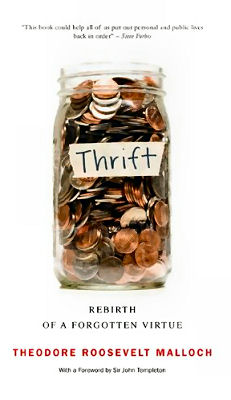
|
Posted December 15, 2009
Book: Thrift: Rebirth of a forgotten virtue Author: Theodore Roosevelt Malloch Encounter Books. New York. 2009. Pp. 225 An Excerpt from the Jacket:
An Excerpt from the Book: Many have tied this concept of work to the emerging doctrine of the sovereignty of God. It is critical for understanding the role of persons in the world. The question I put to you is this: Does this sovereignty relate to soteriology as well as individual salvation? Or has God’s svereignty been slowly shoved to the margins and effectively privatized? If linked to creation it has wide implication. The familiar biblical phrase “Christ is Lord of All” should mean more than lordship of narrow individual behavior or for one hour on Sunday morning in a church pew. The phrase has a cultural mandate, also impelling action in society and in the economy. The possibilities are manifold, all with an option to serve God or to bend to another manmade idol. Faithful stewardship is careful administration of what has been entrusted to you by someone higher than yourself. In Aristotle the oeconomia, which translates as “stewardship,” did not have to do with some separate category of ethics that can or cannot be related to real-life decisions. It had to do with the whole character of the actor. We have today removed ths normative element. Table of Contents: 1. The origins of thrift 2. Consumerism and development 3. Virtue and the moral life 4. The consequences of modern selfishness 5. The “spirit” of nations 6. Modern theories and institutions of thrift 7. Thrift and the other virtues 8. Democratic morality and spiritual enterprise |
|
